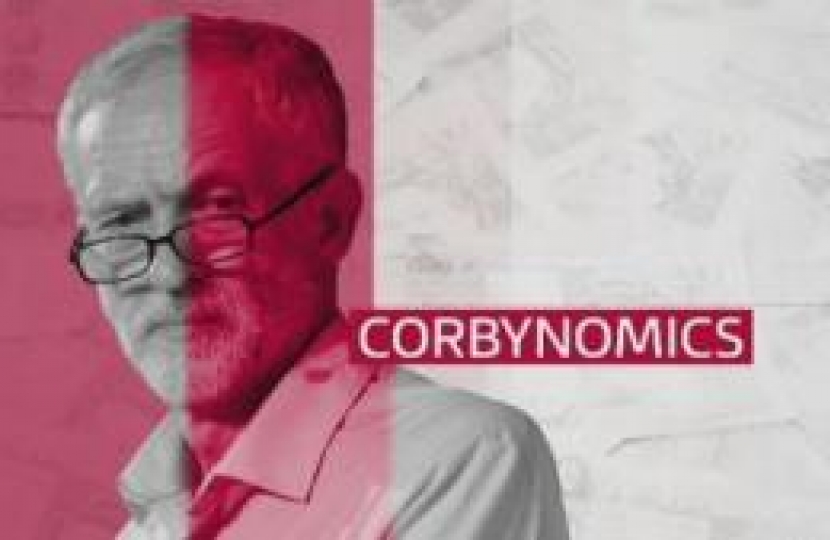
By Richard Mather
People are themselves. They are not objects to be pushed around by the State, which is what the new Labour Party leader, Jeremy Corbyn, proposes. This is why the British public shouldn’t be seduced by Corbyn’s vision of economic statism in which individualism, hard work and enterprise are demonised by expensive and controlling government.
Corbynomics, which is characterised by social ownership of the means of production and of the economy, is inefficient, unrealistic and reactionary. Corbynomics will not transfer power from the top of society to the bottom. It will merely hand power to (and enrich) apparatchiks, trade unions, politicians and state bureaucrats. In other words, a Corbyn government means power will be centralised and controlled by an overstaffed elite.
Corbyn’s economic statism reduces everything to the banality of the One: a one-size-fits-all economic narrative that ignores regional, local and competitive differences. The notion of the State as a single essence was a twentieth century experiment that failed. Look at the continental catastrophes of communism or fascism, or the public sector battles in the UK during the 1970s. It was only with the formation of a new British consensus in the 1980s and 1990s – first under Thatcher and then Blair – that taxes were lowered and the monopoly of public sector power was broken, thanks in part to the privatisation of some industries/services.
Social mobility in the twenty-first century will not be helped by a return to an outdated economic public sector model. Contrary to popular opinion, the free market is not a reductive enterprise; rather, it is the guarantor of aspiration and progress. There is nothing immoral about people buying goods and services produced for profit. We need entrepreneurs, businesses and companies to invest in our local and regional economies, and to create new jobs. And of course, profits can be reinvested, fuelling economic growth and reducing prices for consumers.
Corbyn’s vision of the State comprises an unworkable trinity of nationalisation, people’s quantitative easing and higher taxes. But this trinity will not result in some kind of utopia. Renationalisation of the railways will require huge public investment, paid for by higher taxes on people who already work very long hours. Nor will renationalisation make the system accountable to taxpayers. Indeed, in the land of Corbyn, our democratic rights over state services will be endlessly deferred in a chain of bureaucracy and political obfuscation. Our frustrations with the railways will not diminish if the State steps in. On the contrary, our concerns will grow because of less choice, higher costs, below-par service and unionised public sector strikes.
Also troubling is the Corbynomic vision of so-called people’s quantitative easing, whereby the Bank of England prints money to bankroll socialism, which could lead to high levels of inflation. As Bank of England governor Mark Carney points out, “The people who tend to get hurt the most by inflation are the poor, the elderly, those that can’t hedge themselves – that’s been the experience throughout history.” Far from entering the lives of the vulnerable and transforming them for the better, Corbynomics will hurt the most disadvantaged and leave them with less money to spend on essentials and luxuries. Again, Corbynomics robs us all – but especially the poor – of personal and economic autonomy.
Finally, higher tax rates do not necessarily yield more revenues because they reduce incentives to work. What Corbyn fails to understand is that the UK is actually becoming more equal. The top one per cent of earners in the UK now shoulder a greater share of the income tax burden than at any time in our country’s history. In other words, Chancellor George Osborne’s taxation policy is sensibly progressive. Corbynomics is regressive and will generate less income for the country.
Corbynomics is a fantasy. It is an illiterate and ideologically-driven economic metanarrative that elevates and enshrines the grand role of the State and punishes the virtues of localism, eclecticism, enterprise, healthy competition and personal aspiration. These virtues help make Britain a modern and exciting country. Corbynomics, by contrast, is a return to the old and defeated arguments of the 1970s when high inflation, government inefficiency, bad services, trade union militancy and low growth turned the UK into the sick man of Europe.
Labour needs to get real and reach out to the British people with sensible and moderate policies. The electorate is neither stupid nor naïve. Given that the country rejected Ed Miliband in May 2015 and voted for a Conservative majority government for the first time since the 1990s, they are hardly likely to vote for Labour’s dangerous economic statism in 2020.

